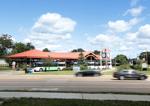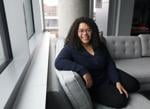Amid an outpouring of private and public support, a symbolic turn of earth Friday formally launched the Urban League of Greater Madison’s $25.5 million, four-story Black Business Hub to rise at the Village on Park mall on the South Side.
On a chilly afternoon, with an upbeat crowd of hundreds in attendance, Gov. Tony Evers proclaimed the groundbreaking a “great day” for the city and state, U.S. Sen. Tammy Baldwin, D-Madison, announced via video $1 million in federal funding for the project, and Kim Sponem, president and CEO of Summit Credit Union, said the credit union will open a branch at the development at the corner of South Park Street and Hughes Place.
“If the Urban League won’t bet on Black businesses, who will?” president and CEO Ruben Anthony said, describing a vibrant center for commerce, innovating and gathering. “We have to lead by example. We have to take some risks. When we work together, there are no limits.”

Urban League of Greater Madison president and CEO Ruben Anthony, left, and Wisconsin Gov. Tony Evers prepare for the ceremonial groundbreaking of the $25.5 million Black Business Hub as members of the public and the press document the occasion at the Village on Park mall.
The Black Business Hub will feature retail and other businesses owned by Black and other entrepreneurs of color, ranging from startups to established businesses looking to expand or take on storefronts for the first time. The activities will include food, health and wellness, financial services, entertainment, technology, co-working space, a rentable commercial kitchen and more.
People are also reading…
The Hub will also offer loans, grants, technical assistance, networking and space for government, nonprofit and small-business development agencies.
A striking contemporary design features a two-story, glass-sheathed atrium with spaces for commercial space on the first floor and part of the second floor, and outdoor space for vending and restaurant seating along the South Park Street frontage. A rooftop patio is intended to foster professional networking.

Baldwin
“The Hub is a long-overdue investment,” Baldwin said in a statement. “The Hub will serve as an incubator for entrepreneurs and innovators, empowering and inspiring tomorrow’s leaders.”

A rendering of the Urban League of Greater Madison’s $25.3 million Black Business Hub to be built at the Village on Park mall on the South Side.
The Urban League chose the corner of the mall at 2300 S. Park St. and Hughes Place for the Hub, a roughly 80,000 square-foot building envisioned as a national model for boosting minority businesses.
The Hub ties into the city’s vision for the Village on Park, which has about 120,000 rentable square feet on 7.8 acres with tenants including retail, offices and government services. The city and Community Development Authority are looking to develop low-cost housing on the northern end of the site along Ridgewood Way, while also addressing parking with a $10 million, six-level garage with 295 spaces.
“The city has been a tremendous partner on the project and helping us incorporate our plans into the broader redevelopment,” Urban League executive vice president Edward Lee said.

About two-thirds of the Hub’s space will accommodate retail and other businesses. The hub’s tenants will range from startups to established businesses looking to expand or take on storefront locations for the first time, officials said.

A rendering of the interior atrium of the Black Business Hub at the Village on Park mall.
Already, the Hub has lined up as tenants the Wisconsin Economic Development Corp., the Wisconsin Women’s Business Initiative Corporation, Exact Sciences, the Madison Black Chamber of Commerce and Hope Community Capital, and is negotiating leases with other Black-owned businesses, Lee said.

Lee
Nearly 50 small and emerging Black businesses have expressed interest in locating there, he said.
“The Hub will be transformational for generations of Black entrepreneurism in the Madison region,” Anthony said. “It will also be transformational for South Madison, and for the entire Madison region.”
Summit Credit Union will be a tenant and a financial wellness resource, Sponem said.

Sponem
The credit union “will work with families and businesses to make good financial decisions and to expand and build wealth,” she said. “The Hub not only provides space for businesses to accelerate, but the Hub will also accelerate Madison as a place where anyone can be successful.”
As part of the Hub project, the Urban League and partners have created the Black Business Hub Accelerator Program aimed at supporting Black entrepreneurs and building a pipeline of businesses that may locate a new or expanded business there.

The program includes a loan and grant fund underwritten by the Urban League, culturally relevant small business technical support services, and facilitating a place-based network of Black entrepreneurs
Over the next few years, it’s estimated that the Hub will support a minimum of 200 Black-owned businesses and entrepreneurs, create or relocate more than 150 jobs, create at least 250 temporary construction jobs, train Black real estate developers, and more, officials said.
Construction of the Hub began in late March and the building should open in early 2023.
Outpouring of support
The vision for the Hub emerged after more than two years of engagement led by multiple entities that involved more than 150 civic leaders, neighborhood residents, government officials, business leaders and others, officials said.
They coalesced around a common vision — “Agenda South” — that seeks to ensure that fast-encroaching economic development is equitable, rather than gentrifying. A community advisory team of nearly 20 people developed a set of guiding principles to ensure the project achieves those goals.
“It will create jobs, generate wealth, incubate new ideas, nurture talent, and so much more,” Anthony said.

Anthony
With the $1 million in federal funding, the Hub now has $18.5 million of the $25.5 million it needs for the project.
The Urban League is partnering with the city, Dane County and the state. The city’s Community Development Authority provided land for the project, and the county delivered a $100,000 pre-development grant and $2 million for construction. The state has delivered $5 million through its Neighborhood Investment Fund.
“This is such a fantastic day for our city,” Mayor Satya Rhodes-Conway said. “The city and the CDA are going to keep investing in this project.”

The Hub has received contributions of $500,000 or more from six corporate or foundation partners, is working with other financing partners and received $1 million from private donors and community members.
“This is a community project that’s going to succeed because it’s built by the entire community,” Evers said.

Urban League of Greater Madison president and CEO Ruben Anthony, left, Juan José López, center, and Martin Lackey take a selfie during the groundbreaking celebration for the Black Business Hub. Hundreds attended Friday’s event.
In 2004, the CDA purchased the site as part of a master plan to redevelop the worn mall into an attractive, vibrant, multiuse space. The Village on Park’s two-story atrium was redesigned in 2009 to include community rooms, office space and restrooms. Also that year, the CDA sold off part of the site to the Urban League and Madison Public Library, which have developed facilities there.
The Urban League’s fundraising campaign still has to raise $7 million to reach its goal of $25.5 million. Those interested in supporting the Black Business Hub or learning about it can visit www.ulgm.org/black-business-hub.
PHOTOS: The Progress Center for Black Women has a new home

The entrance to the new home for the Progress Center for Black Women has a reading area for children. Sabrina Madison, founder of the center, wants to encourage literacy by making books available to members and visitors of the center.

A central lounge at the Progress Center for Black Women has been set up for conversation, games or meetings.

One corner of the space serves as a relaxation and meditation space, complete with a portable fireplace and white noise machine.

The new space is nearly twice the size of the center’s previous location in Fitchburg.

Books are available for members to borrow. A new book club will launch next month, starting with with, “The Memo, What Women of Color Need to Know to Secure a Seat at the Table” by Minda Harts. Madison Public Library donated 30 copies of the book to the center.

The new space for the Progress Center for Black Women has a relaxation and meditation corner, a library, meeting space, a lounge area, work tables, a children’s reading area and a kitchen.

A painting by Jasmine Wyatt is displayed over the coffee station at the new home for the Progress Center for Black Women. According to founder Sabrina Madison, Wyatt is an artist with Madison roots.

A painting by Jasmine Wyatt is displayed next to Melissa Austin’s photographs of women from a past Black Women’s Leadership Conference.

Words of encouragement are written on the dry erase board in the meeting room at the new home for the Progress Center for Black Women.

Sabrina Madison speaks with Latonya Jackson about the plans for Jackson’s new business, Waiting to Exhale Events, at the Progress Center for Black Women in downtown Madison.

Sabrina Madison gives event planning advice to Latonya Jackson as she plans the kickoff event for her new business, Waiting to Exhale Events.

Sabrina Madison gives Latonya Jackson a tour of the meeting room. A logo for Ambition, a new professional development program, has been applied to the wall.

Sabrina Madison tells Latonya Jackson about the photo backdrop that was installed on the wall of the center.

Sabrina Madison tells Latonya Jackson about the new space.
“The Hub will be transformational for generations of Black entrepreneurism in the Madison region. It will also be transformational for South Madison, and for the entire Madison region.”
Ruben Anthony, Urban League of Greater Madison president and CEO



